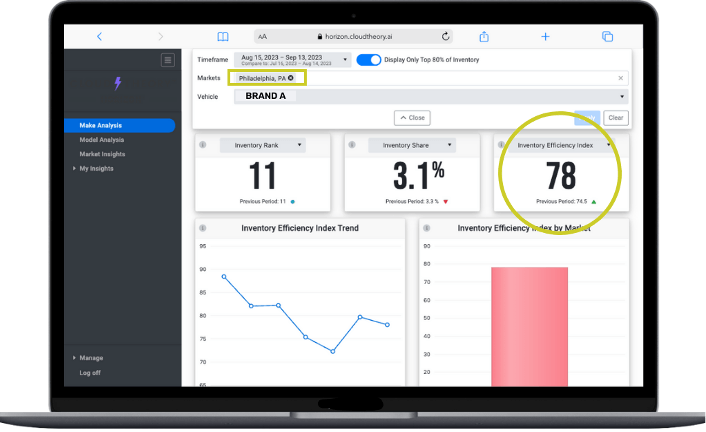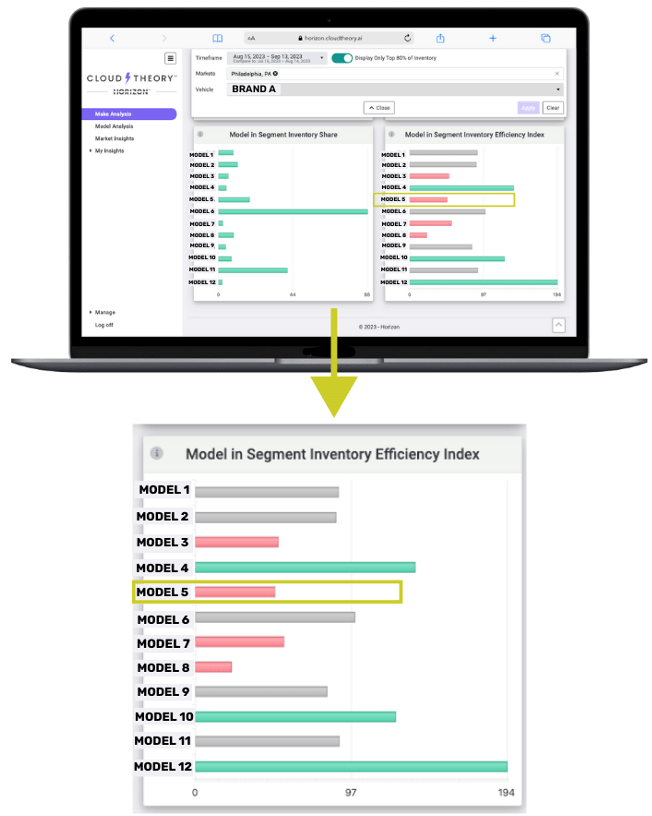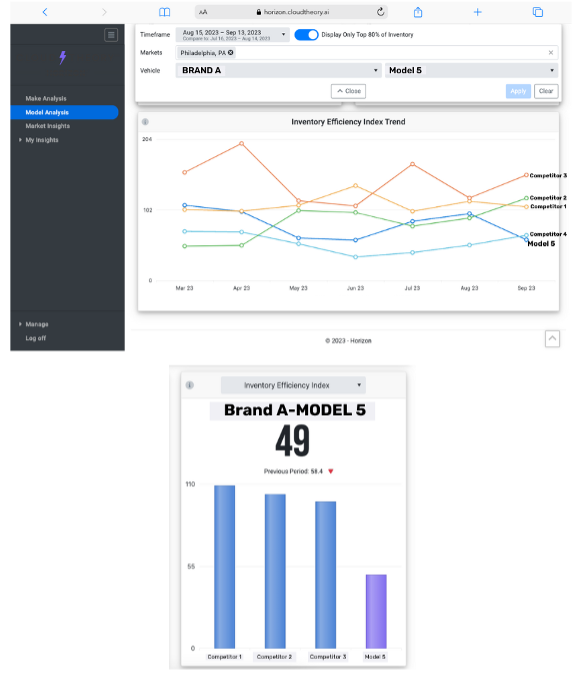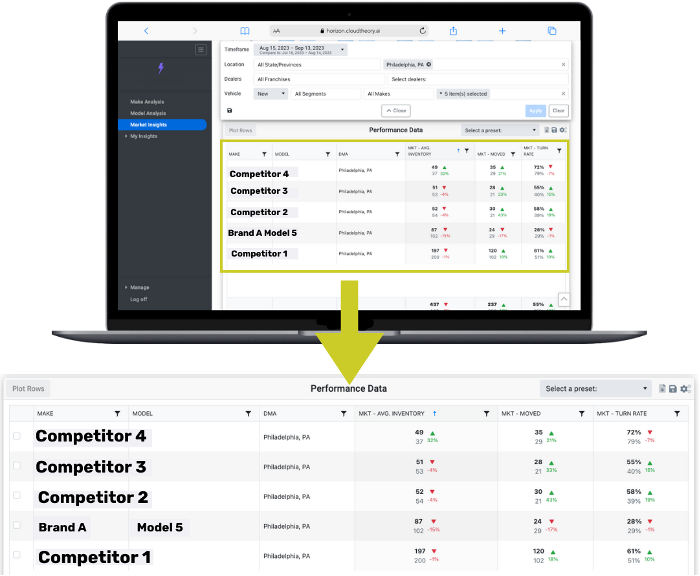Cloud Theory has frequently mentioned the important role data plays in the day-to-day operations of automotive OEMs. An OEM needs effective tools to organize automotive data and visualize insights to support decision-making. Allocating marketing dollars and vehicles to best match demand with supply (or vice versa) requires a real-time and complete market understanding of not just an OEM’s positions but that of its competitors.
For an OEM to make automotive marketing decisions, proper tools that clearly organize and visualize information are crucial. Data gathering itself is useless to an automotive OEM if the brand lacks the ability to analyze that data properly and extract clear information, especially insights on what regions or models are performing well or are vulnerable against the competition.
The Proper Tools Make All the Difference When it Comes to Automotive Marketing Decisions
Cloud Theory’s Horizon platform is a powerful automotive data solution designed to present an OEM with a complete visualization of a brand’s performance. Using sophisticated AI, machine learning, and real-time inventory and movement data, Horizon quickly identifies areas of opportunity based on relative supply and demand positions of vehicles across the entire U.S., from regional, state, or city level, and can be customized to reflect the geographical definition of how an OEM defines their regions.
Horizon’s abilities rely on Cloud Theory’s unique and propriety data collection methods. Horizon offers insights based on real-time data that is updated daily. This real-time data collection enables OEMs to leverage Horizon’s insights to make timely inventory and allocation decisions, view competitor’s data, and examine stats when it comes to their least/most successful models and market regions.
An integral component of Horizon is Cloud Theory’s patent-pending Inventory Efficiency Index (IEI), which provides a previously unavailable real-time view of market-relevant supply and demand of all makes and models across all geographies. Key decision-makers can use the IEI to confidently allocate valuable marketing and incentive dollars to locations requiring a boost in demand or reallocate vehicles to locations that are moving inventory more efficiently. Cloud Theory's Inventory Efficiency Index assigns scores to vehicle makes based on current active inventory and sales data compared to competitors.
- A score of 100 means that an OEM's demand is in balance with its relative supply in the marketplace.
- A score above 100 indicates that a make or model is selling its inventory more efficiently than average.
- A score below 100 means that there are opportunities to bring demand into better alignment with supply (or vice versa).
Breaking Down Automotive Data to Model and Market Specifics
Below are screenshots taken directly from the Horizon platform to show a real-life example of the in-depth data that Horizon can provide to automotive OEMs and their marketing agencies.
Horizon shows the overall US Inventory Efficiency Index (IEI) score for “Brand A” is 91 – below the 100 benchmark and therefore indicative of a brand that is selling fewer vehicles than it should given its relative inventory position in the marketplace.
However, the real power of Horizon is in its ability to identify where Brand A is falling short. By looking at the IEI by DMAs, the platform shows exactly which geographies are giving Brand A the biggest challenges. As an example, let’s take a look at the city of Philadelphia.
.png?width=695&height=695&name=HarnessingDataBlog_HorizonScreenshots%20(10).png)
Although Brand A’s IEI in Philadelphia has risen almost 4 points in the last 30 days compared to the previous period, its score of 78 is still well below the 100 threshold. The IEI trend data also shows a slow increase from a low point in June 2023, but Brand A has not been close to the 100 IEI score since April of this year. This DMA is in clear need of support and attention.

To add another layer of understanding, Horizon can identify which models for Brand A have low IEI scores in the segment that each competes in. For Philadelphia, it is clear that Models 3, 5, 7, and 8 are all well below the threshold of 100 and are significant contributors to the shortfall in performance occurring in this DMA.

Model 5 for Brand A has an inventory efficiency index rating of 49, which is a decrease of 9 points from the previous period. Looking at the trend data for direct competitors to the Model 5 shows an increase in Inventory Efficiency for competitors 1-4, but a decrease for Brand A’s Model 5.

Real-Time Competitor Insights
When looking at the specifics of the Philadelphia market with Brand A and the direct competitors of Model 5, the data is clear on where and in what way the competitors are succeeding against Brand A.

Brand A has had a decrease across the board, with average inventory, movement, and turn rate all decreasing over the last period.
Competitors 1, 2, and 3 have been moving more vehicles and have a higher turn rate, even with a decreased average inventory. Meanwhile, Competitor 4 has increased inventory with increased movement, and although turn rate is down, it is because its inventory and vehicle movement positions are growing, but the former is accelerating faster than the latter.
Simply put, Competitors 1,2, and 3 are doing “more with less”, and are therefore prime contributors to the overall slide for Model 5, while Competitor 4 is also adding to the competitive pressure in this geography.
If an automotive OEM is not efficient in its performance, the Horizon platform can clearly identify what is struggling, where it is having issues, and from whom that competitive pressure is coming from. With this data collected by and displayed on Horizon, an OEM like Brand A can make informed marketing or inventory decisions.
Automotive OEMs Need Data to Stay Competitive
Big data and machine learning are increasingly vital in automotive marketing. These technologies enable OEMs to create detailed marketing efforts, optimize pricing and inventory management, predict market trends, and enhance overall competitiveness in the market. But it’s not only the gathering of data that OEMs need; it’s the ability to analyze data in an easy-to-read and actionable format. Horizon gathers and packages this data in a solution that empowers automotive OEMs to make informed marketing decisions and navigate the complex landscape of the automotive industry with precision.




-1.png?width=300&height=175&name=Untitled%20design%20(52)-1.png)
